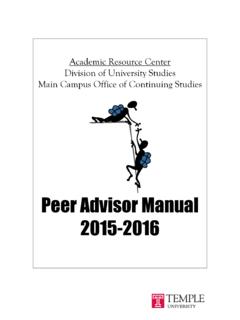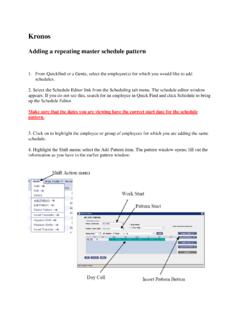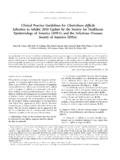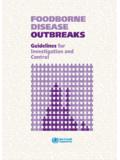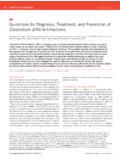Transcription of WRITING GUIDELINES: GENERAL PRINCIPLES & RULES
1 WRITING guidelines : GENERAL PRINCIPLES & RULES1. Professor David G. Post2. Beasley School of Law, Temple University Last Revised: June, 2013. There is nothing more important in the practice of law than your ability to put together quality written work. I'm happy to help you work on your WRITING , but be forewarned: WRITING is difficult, for everyone at least, everyone I know (or know of) who does it well. If you think you can produce top-quality written work without pain and hard work you are either (a) incredibly gifted or (b) mistaken. When asked whether she enjoyed WRITING , Dorothy Parker replied No . I enjoy having written.. When asked whether he found WRITING difficult, Red Smith replied: Not at all you just sit down at the typewriter and open a vein.. Please read these guidelines through carefully. They are divided into GENERAL PRINCIPLES . and RULES . The former are for you to contemplate and consider; the latter are for you to obey, blindly if necessary.
2 I have very strong views about the process of WRITING , and I demand a very serious commitment on your part. Please ask yourself, after you have read through the following, whether you are prepared to do what I'm asking you to do. If not, feel free to reconsider working with me; I will not be offended, and we will both be spared considerable future unhappiness. 1. These WRITING guidelines are distributed under a Creative Commons Attribution License (ver , available at Please copy, redistribute, and reuse. 2. Comments always welcome: WRITING guidelines David Post June, 2013. Page -1- I. GENERAL PRINCIPLES . Good prose is like a windowpane [George Orwell, Why I Write ]. The point of legal WRITING is not to make the simple complicated for example, by using lots of impenetrable phrases, interminable sentences within interminable paragraphs, and big words, or by constantly reminding the reader that it is not entirely clear, but, .. or that courts have left this area very uncertain.)
3 Or the like. The point of legal WRITING is to make the complicated simple. Do not be afraid of simplicity. Though we have all been taught that simplicity is a sign of stupidity, it is not. You want your reader to say, after having read your brief or your memo or your article, something like: Well, that was simple.. Good prose is like a windowpane in that, like a windowpane, it is transparent, allowing the viewer to see, clearly, whatever is on the other side. In legal WRITING , the other side comprises the ideas, arguments, and opinions that you hold in your head. Good prose allows the reader to see those, clearly. This presents a problem. If your prose is like a windowpane, then, as Orwell so nicely put it, when you make a stupid remark its stupidity will be obvious, even to yourself. Often, when putting together written work, you will think to yourself: My ideas and thoughts are a jumbled-up mess. I don't have any sort of argument' about why so-and-so exposes you to liability for such- and-such.
4 I don't want my prose to be like a windowpane, because then the reader will see just how confused I am.. This is an understandable reaction, but it is to be avoided at all costs. You have to want to write clearly if you are going to learn how to do it. Being confused about the law is no sin; the law is very, very confusing, certainly when you are first learning it and even after you've been at it for many years. The law is full of simple questions . Would I be liable for copyright infringement if I were to download a photograph of President Obama from the website and display it on the screens in my classroom? . WRITING guidelines David Post June, 2013. Page -2- - that are actually quite complex, requiring an understanding of complicated statutory provisions, caselaw that may be conflicting or contradictory and that in any event never seems to quite answer the precise question being asked, etc. Whenever you are analyzing hard legal questions, your initial thoughts and ideas are likely to be something of a jumbled mess; it is to be expected, and it happens to all of us.
5 At the start of your project, you won't have anything resembling a clear argument in your head, or even much of an idea of what such a thing would look like. That's not the problem. We all start there; it is an inevitable part of the process of trying to master very complicated material. The problem arises if you allow that to dissuade you from WRITING as clearly as you possibly can. Exposing the disorder in one's mind can be pretty painful, but one of the functions of WRITING is to help you see what it is that you don't understand, so that you can go out and do some the thinking/reading/research necessary to understand it. If you are confused, explain your confusion to the reader as clearly as you possibly can that will help you figure out where the confusion lies, and will help you figure out how to eliminate it. Impersonate your reader There is one WRITING skill that is critical and on which all others, in a sense, depend: the ability to read your own work as it appears to a reader.
6 The process of WRITING well consists of (a) WRITING something, (b) reading what you have written from your reader's perspective, and (c). revising what you have written so that it is clear to your reader. Over and over again. To do that, you must, first of all, know (or decide) who your reader is, because the question Is what I have written clear? implies the question: Clear to whom? Your explanation of why section 512(c) of the Copyright Act covers dissemination of decryption software, or why business method patents do not serve the purposes underlying the Patent Act, or why the Copyright Royalty Tribunal is unconstitutional under the doctrine of separation of powers, etc., will be very different, depending upon whether you are explaining that to (a) a judge on the Federal Circuit, (b) the Chief Systems Engineer at Comcast, (c) a reader of the Philadelphia Inquirer, (d) a high school student, (e) a partner at your law firm who specializes in international tax law, (f) a partner at your law firm who specializes in patent prosecution, etc.
7 For example, consider this sentence that might appear in your paper: Like much of the DMCA, sec. 512(c) provides ISPs with a safe harbor against copyright infringement claims for monetary damages.. That sentence is either perfectly clear, or complete gibberish; I can't tell which unless I. know who the reader is, because whether or not it is clear depends on what the reader has in her head at the moment she encounters the sentence. What's the DMCA? Who/what are ISPs ? What's a safe harbor ? What's copyright infringement? What are claims for monetary damages ? Either (A) the reader had some idea what these things meant before starting your paper, (B) you have explained earlier in your paper what they mean, or (C) the sentence is a failure and needs to be revised because the reader does not know what it means. WRITING well means satisfying yourself that either (A) or (B) is true, for every sentence in your paper. WRITING guidelines David Post June, 2013. Page -3- Reading your own work from your reader's perspective means learning how to clear your head of everything you have learned about the subject matter from having worked on the paper, because your reader often will know nothing, or next-to-nothing, about the subject matter; at the very least, he knows a great deal less than you do.
8 Your reader does not know what you know, has not read what you have read, has not been surrounded by articles about this subject matter for weeks or months the way you have, etc. If you keep all of that stuff in your head as you read over what you have written, you may conclude that your WRITING makes sense and is reasonably clear (to you) when it is actually very confusing to your reader (who does not have any of that in his head). You have to ask of your own work what the reader will ask: Does what I am reading make sense (to someone who knows next-to-nothing about the subject matter at hand)? What exactly is the author ( , you) trying to say here? Why is the author suddenly talking about X. when I thought she was talking about Y? Am I learning something as I read? Developing an ability to edit your own work in this way may be the most important thing you will get out of your WRITING project. You are the one editor who will always be at your own disposal throughout your career as a lawyer, the one person who will always be available to read your work and to comment upon it, to help you see which arguments are strong and which are weak, which sections make sense and which do not.
9 To put it differently: When you begin your project, I want you to be focused on my editorial comments; by the time you're finished, I want you to be focused on your own. Your language becomes clear and strong not when you can no longer add, but when you can no longer take away. [Isaac Babel]. Less is more. Say what you need to say. Eliminate unnecessary words. Get to the point. Here's an excerpt from a student paper: In Blumenthal v. Drudge, 992 F. Supp. 44 ( 1998), the district court ruled that the defendant was subject to the personal jurisdiction of the court. In so ruling, the court found that both prongs of the personal jurisdiction test had been met. First, the court found that the defendant fell under the District of Columbia's long arm statute, Code 13-423, and was therefore subject to the jurisdiction of the court. Second, the court found that the defendant possessed the minimum contacts with the District of Columbia necessary for the exercise of personal jurisdiction to be constitutional.
10 It's not bad, but here's my edited version: In Blumenthal v. Drudge, 992 F. Supp. 44 ( 1998), the district court ruled that the defendant was subject to the court's personal jurisdiction. The defendant satisfied both prongs of the personal jurisdiction test: he fell within the District of Columbia's long arm statute, Code 13-423, and possessed the minimum contacts with the District of Columbia required for the constitutional exercise of personal jurisdiction. These are the changes I made in going from the first to the second version: WRITING guidelines David Post June, 2013. Page -4- In Blumenthal v. Drudge, 992 F. Supp. 44 ( 1998), the district court ruled that the defendant was subject to the court's personal jurisdiction of the court. In so ruling, the court found that. The defendant satisfied both prongs of the personal jurisdiction test had been met. First, the court found that the defendant : he fell underwithin the District of Columbia's long arm statute, Code 13-423, and was therefore subject to the jurisdiction of the court.


